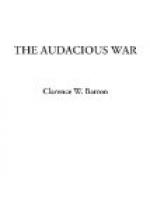As Germany developed in industry, the military caste receded relatively. Bankers, merchants, shippers, and traders came to the front. Railways bent the traffic of the country to the sea, and harbors and ports of commerce grew with rapid strides.
“What a wonderful business man is the German Emperor!” said the world. “He advertises Germany all over the earth by the spiked helmet and the rattle of his sword, but never war seeks he.” The world must now revise this opinion.
German unity gave rise to German efficiency and German thoroughness, and to a demand for a larger German unity. The whole German-speaking race must be put together and bound together. Germany must expand over the seas, in colonial empire, and by tariffs of her own making. This meant that the Germans must have dominion on sea as well as land. Alliances must first be cemented with Austria and her neighboring states. Italy must be dragged into a triple alliance; and the small Balkan States must be tied up with Austria, that through an alliance with Turkey, Germany might reach not only the Mediterranean but the waters of the Pacific. This must happen before the great try-out for the mastery of the seas.
Now, the central point in the study of Germany under the present Kaiser is the naval programme for over-seas conquest, which was originated entirely by the present Kaiser. It was he and no other who aimed to turn defensive Germany into aggressive Germany. He has been the author from the beginning of the entire naval programme.
Such a plan must take cunning and strategy covering years. It must proclaim peace to the world but rouse all the fighting blood of the German-speaking race. The spirit for world-conquest must be stimulated in all literature and art, in education, and commerce; with the individual and the family. The danger of Germany must be pointed out. The greatness and rightfulness of her ambitions in the world must be brought forward and educated into the blood of every growing German.
While to the outside world steadily proclaiming peace, the Kaiser was as steadily inculcating war and the principles of war into every avenue of German thought and philosophy.
The Germans are nothing if not logical and scientific. They must therefore find a reason in philosophy and in the facts of history for their national programme. Those who found these reasons and logically set them forth were hailed as the great philosophers and educators of Germany. The logic was simple. It was that all history and all progress had been made by war; that peace-loving races decayed, and finally perished, and their places were rightfully taken by the younger, braver, sturdier, and hardier fighting races.
“Let your superiority be an acceptance of hardship.” “Die at the right time.” “Be hard.” “What is happiness? The feeling that power increases, that resistance is being overcome.” Nietzsche thus talked the principles of this philosophy; a something entirely apart from the principles of the Christian religion, but an absolutely philosophical, modern paganism; a worship of power, the assertions of one’s individual and national self—“The Will to Power.”




